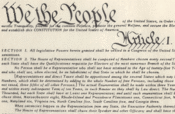State Action Doctrine
 From Conservapedia
From Conservapedia | Part of the series on |
| U.S. Discrimination Law |

|
| Standards of Review |
| Other Legal Theories |
|
Substantive due process |
| Defining Moments in Law |
|
The 14th Amendment |
| Modalities of Constitutional Law |
State action doctrine is a legal principle that the Fourteenth Amendment applies only to state and local governments, not to private entities. Under state action doctrine, private parties outside of government do not have to comply with procedural or substantive due process under the Fourteenth Amendment. For example, the First Amendment does not apply to private schools because they are not part of state or local government.
There are two exceptions to this rule for:
- public functions
- entanglement
These exceptions hold that private corporations performing government functions, such as handling law enforcement in a small town, would be subject to the Fourteenth Amendment. Similarly, high school athletic associations dictating who may compete in high school programs have been held to be subject to the Fourteenth Amendment. This is important to homeschooling as it attempts to end discrimination by public school sports leagues.[1]
References[edit]
Categories: [Law]
↧ Download as ZWI file | Last modified: 02/28/2023 09:35:22 | 29 views
☰ Source: https://www.conservapedia.com/State_action_doctrine | License: CC BY-SA 3.0
 ZWI signed:
ZWI signed: KSF
KSF